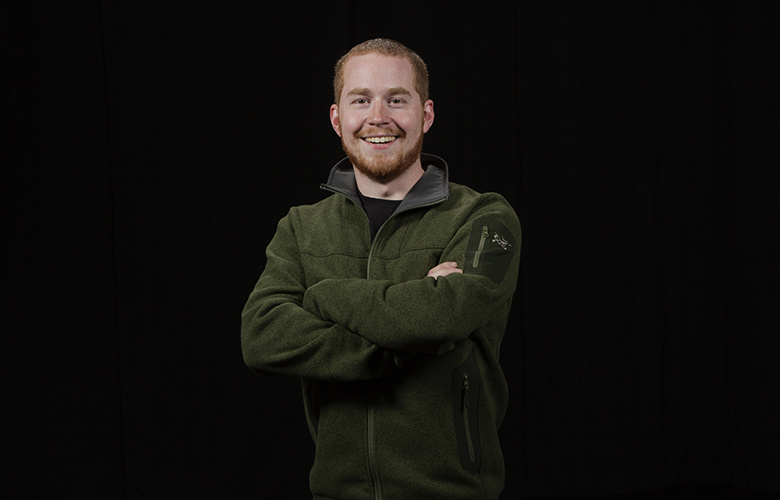
TheatreArtLife has connected with a number of Entertainment Riggers across the globe to bring you their stories, experience and advice on the very crucial roles and responsibilities Riggers hold in today’s industry. Andrew Mudie is based in Lancaster, Pennsylvania and works for TAIT. Here is his story:
I started my path to entertainment as a freshman in high school. My mother insisted I did something other than sports after school so I landed on building sets for the school plays and musicals. From this, I was able to try my hand at most roles in the theatre and it wasn’t long before I realized that rigging, and working at height, was what most excited me.
I went to college at Radford University in pursuit of a degree in technical theater and it was there that I was afforded the opportunity to intern during my summers with Cirque du Soleil in Las Vegas, as part of the rigging crew, and also in New York at Glimmerglass Festival, again as a rigger. Those summers interning cemented my interests in rigging. So when I graduated college I was looking strictly for jobs in that discipline and I was lucky enough to find myself at TAIT.
The best job training is being on the job, working next to people that are smarter and more experienced.
The bulk of my learning about rigging came from my summers interning at different companies across the country with veterans of the industry who have passed down knowledge and tricks of the trade. Truly invaluable.
Certification courses are a different story and are just as important and necessary. Specific to rigging and working at height, I have taken certification courses in high angle rope rescue (as part of a fire department program), rope access training, chain motor maintenance and repair. I’ve also been certified in emergency medicine as an EMT. Training is something we take very seriously at TAIT, in fact some of our employees provide certified training classes in rigging, performer flying, automation and other disciplines.
I think my favorite show that I have worked on has been the current Taylor Swift World Tour. The creation of the tour was a challenge from day 1. Everything in the show that we built at TAIT was custom, bigger and heavier than any other tour that has come before. It provided a lot of challenges just based on the sheer size, weight and number of moving parts in the show. The entire tour travels around in excess of 100 tractor trailers!
Tough and competent.
Those are the two words that come to mind when I think of what makes a good rigger. You have to be tough to stand up to anyone and say something isn’t safe or right. And because of the inherent danger in rigging, there is no substitution for competence. Rigging involves a lot of critical thinking, foresight, math and problem solving. And that’s not always something you can teach.
It might seem hard to get in to at first, but all it takes is knowing someone to get your foot in the door. Community theater is a great place to start and learn the basics. Keep aspiring to know more. The phrase “You don’t know what you don’t know” is very dangerous in the rigging world.
It might be cliché to say, but there is no typical day for me on the job. About the only consistent thing in my work day is my morning coffee and bagel. Otherwise I’m usually working on getting an automated rigging system installed, functioning and tested for functionality and safety.
I don’t have a single mentor, but instead I consider my co-workers to fill that role. Every one of them has more experience than the next and are a great source to answer questions and get advice.
Downtime? What’s that? Well when I actually have time off I love to go rock climbing, climb mountains in the pacific northwest, sleep in and generally try to be stress-free.
I am currently based in Lancaster, Pennsylvania and work full time for TAIT. I have been at TAIT for roughly 5 years now.
Women Of Automation Part 1: Justine Marie Benoit
Theatrical Automation With Robert Pooley


Anna Robb is Co-Founder and Managing Director for TheatreArtLife. Anna is an experienced Producer/Production Stage Manager. Her 20-year work history spans Asia Pacific, the Americas, Africa, the Middle East and Europe. She has worked for companies such as Cirque du Soleil, Franco Dragone Entertainment Group, Christie Digital Systems and The Sydney Opera House. Anna was an integral part of the research and development, training and formation, creation and operation of the 250 million dollar aquatic show, The House of Dancing Water in Macau. She also maintained the daily operations of this complex show as the head of Stage Management for 7 years. Anna has been employed on over 70 shows in the areas of concerts, arena events, corporate events, trade shows, musical theatre, plays, dance, circus, outdoor festivals and mega shows. Anna holds a honours degree in Design for Theatre and Television and is passionate about the evolution of the industry.
Read Full Profile© 2021 TheatreArtLife. All rights reserved.

Thank you so much for reading, but you have now reached your free article limit for this month.
Our contributors are currently writing more articles for you to enjoy.
To keep reading, all you have to do is become a subscriber and then you can read unlimited articles anytime.
Your investment will help us continue to ignite connections across the globe in live entertainment and build this community for industry professionals.